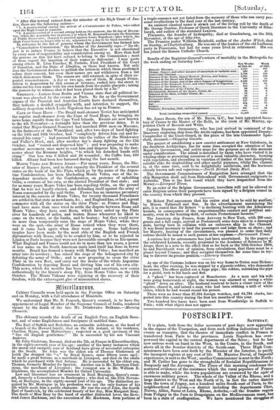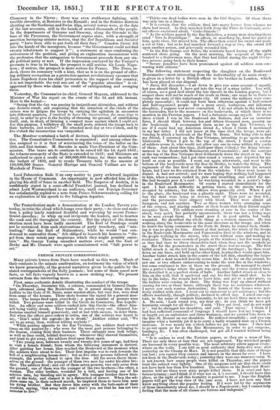POSTSCRIPT.
SA.TITRDAY.
It is plain, both from the fuller accounts of past days now appearing in the organs of the Usurpation, and from such trifling indications of later events as transpire, that the theatre of immediate conflict in France is transferred from Paris to the provinces. Louis Napoleon has over- powered the capital in the central department of the Seine ; but ho has now serious work on hand in the West, in the Centre, in the South, and above all in the frontier districts of the South-east. Three High Com- missioners have been sent forth by the Minister of the Interior, to pacify the insurgent regions at any cost of life. M. Maurice Duval, of Imperial experiences, is sent to the West ; another Commissioner is sent to the North; and M. Carlier has gone to the strongholds of Socialist Republicanism in Burgundy and the Auvergne. The Times of this morning condenses the scattered evidences of the resistance which the rural populace of France is able to make, while the town populations are overawed by the sight of enormous military power. The whole of the Valley of the Rhone' and a large district to the West and the North of it, in fact the entire district from the town of Joigny, not a hundred miles South-east of Paris, to the neighbourhood of Lyons,—a district including the departments Cher, Nievre, Allier, Saone et Loire, Rhone, Ardeche,—all the frontier region from Poligny in the Jura to Draguignan on the Mediterranean coast, has been in a state of conflagration. We have mentioned the struggles at Clemency in the Nievre ; there was even stubborner fighting, with terrible atrocities, at Bezieres in the Herault ; and in the frontier districts abutting on the Sardinian and Swiss Alps, several towns were, at the date of the last accounts, still in the hands of armed thousands of the people. In the departments of Guienne and Gascony, along the Gironde to the base of the Pyrennees, the Government organs state, with a strength of assertion betraying sinister motive, that the Bed Republican and Socialist party " have been able to put forth all their fury." Comdon (Gera) fell into the hands of the insurgents, because "the Government could not find twenty inhabitants to support it " ; a statement at once confessing the seriousness of the position, and giving an explanation inconsistent with the profession that the antagonism to Government proceeds from any sin- gle political party or sect. If the impression conveyed by the Usurper's accounts is true in its basis, the prospect is still serious for Louis Napo- leon; if untrue, the prospect is more serious for France. The Times, in- deed, closes its summary with a hint, that as it is on the ground of offer- ing military occupation as a protection against revolutionary excesses that Louis Napoleon rests his chief pretension to the support of the country, it is not improbable the real amcont of the "popular atrocities " is ex- aggerated by those who claim the credit of extinguishing and avenging them. Yesterday, the Comman?.er-in-chief, General Magnan, addressed to the Minister of War his report on the events of the 3d and 4th instant. Here is the kernel- " Seeing that the day was passing in insignificant skirmishes, and without any decisive result, and suspecting that the intention of the chiefs of the rioters was to fatigue the troops by carrying. the agitation in succession into different quarters, I resolved to leave the insurrection for some time to itself, in order-to give it the facility of choosing its ground, of establishing itself, and, in short, of forming a compact mass against which I could act. For this purpose, ,I withdrew ill the small posts, ordered the troops back to their barracks, and waited." He attacked next day at two o'clock, and by five o'clock the insurrection was vanquished.
The Moniteur contained a batch of decrees, legislative and administra- tive. The Consultative Commission is organized; and among other du- ties assigned to it is that of scrutinizing the votes of the ballot on the 20th and 21st inittant. M. Earache is made Vice-President of the Com- mission. --The taxes are to continue to be raised till the 1st April 1852 ; the tobacco Monopoly of the State is extended to 1853 ; and Ministers are authorized to open a credit of 360,000,000 francs for three months on the budget of 1852, and to create Treasury bills to tie amount of 150,000,000 francs. General Harispe and General Vaillant are to be Marshals of France.
























 Previous page
Previous page